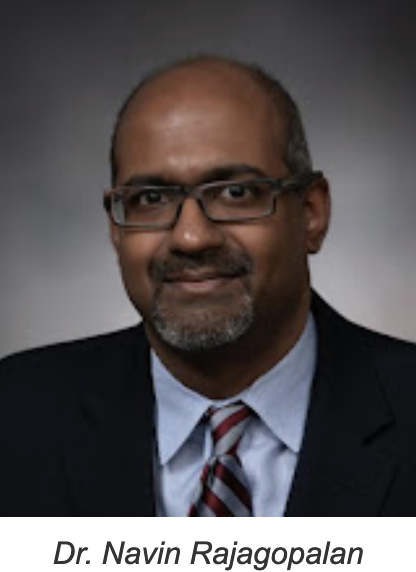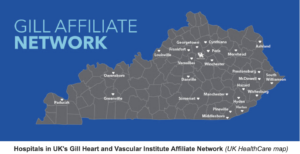UK expands heart and vascular care to hospitals across the state

By Melissa Patrick
Kentucky Health News
One of the many ways that UK HealthCare strives to improve the heart health of Kentuckians is through its Gill Heart and Vascular Institute Affiliate Network, which includes a community of hospitals across the state working to ensure patients receive high-quality cardiac care close to home.
The program serves a great need, since heart disease is the leading cause of death in Kentucky and the state has one of the country’s highest rates of heart disease.
Dr. Navin Rajagopalan, director of the affiliate network, said it is made up of over 20 hospitals throughout the state.
“Our key mantra is always . . . one of collaboration,” he said. “The University of Kentucky is a big hospital, we have lots of services here. But we never want to be seen as competing with local, community hospitals for their patients. So we want patients to stay local for as long as possible to receive optimal cardiovascular care.”
He added that while it’s important for UK’s program to remain strong for patients who may need higher levels of care, the goal of the network is to “provide resources, education, and training, where appropriate, to the hospitals in our network.”
New to the network is Owensboro Health Muhlenberg Community Hospital in the Muhlenberg County seat of Greenville, featured recently in a UK news release. CEO Ed Heath said being in the network “furthers our mission to heal the sick and to improve the health of the communities we serve.”
“We look forward to utilizing the expertise of UK HealthCare and the perks of this affiliation to better serve our patients,” he added.
Rajagopalan stressed that the program isn’t about UK HealthCare taking over a hospital’s cardiovascular program, but is designed to foster collaboration and expertise-sharing among the member hospitals. Members of the network have access to educational resources, quality improvement initiatives and specialized training.
In addition, Rajagopalan said the network can provide outreach clinics or assist with cardiovascular imaging.
“The idea . . . is that patients can receive specialized care close to home,” he said.
When Dr. Michael Karpf was running UK HealthCare in 2013, he said it needed to expand its geographical reach to maintain its newly raised national status and to ensure access to quality care for Kentuckians. “We want the hospital to be the first choice when it comes to complex care,” he said, identifying several regional competitors. First on his list was Vanderbilt University in Nashville, which is 80 miles closer to the Greenville hospital than UK and gets many patients from Western and Southern Kentucky.
Asked if the program is driven by competition in any way, Rajagopalan said, “No, we make it very clear that this is not based on referrals.”
Rajagopalan said UK is not actively recruiting new hospitals into the network and that many of them in the network are ones that they already have a relationship with in some way. More often, he said, hospitals will call UK with a question about something and that’s how they learn about the program. He added that UK HealthCare also offers the Markey Cancer Center Affiliate Network and a Stroke Care Network.
As for money, he said that the fees collected within the affiliate network are put back into the program in some way. “We don’t make any money off the network,” he said.
 According to the news release, the affiliate network includes 24 hospitals, more than 15 outreach locations and more than 12 sites where Gill provides cardiac image interpretation services across cardiovascular imaging modalities.Rajagopalan told Kentucky Health News that the work they are doing at the Gill Heart and Vascular Institute Affiliate Network is “relatively unique.”
According to the news release, the affiliate network includes 24 hospitals, more than 15 outreach locations and more than 12 sites where Gill provides cardiac image interpretation services across cardiovascular imaging modalities.Rajagopalan told Kentucky Health News that the work they are doing at the Gill Heart and Vascular Institute Affiliate Network is “relatively unique.”
“We’re kind of hoping to have more success stories and kind of share what we’re doing to other academic centers,” he said. “Because I think the way that we, as an academic institution, interact with the community hospitals in our region is rather unique in terms of the spirit of collaboration and in trying to support all the hospitals in the community.”